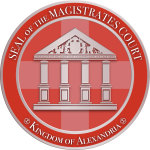ENTREATY OF SUMMARY JUDGMENT
Plaintiff, Nimq_, respectfully moves this Honorable Court for Summary Judgment against the Defendant, the Crown, pursuant to the General Court Rules and Procedures. This motion is based on the grounds that there is no genuine dispute as to any material fact necessary to establish the Defendant's liability for negligence, and the Plaintiff is entitled to judgment as a matter of law.
I. STANDARD FOR SUMMARY JUDGMENT
Summary judgment is appropriate when the pleadings, discovery, and admissions on file show that there is "no genuine dispute of material fact" and the moving party is entitled to judgment as a matter of law.
II. UNDISPUTED MATERIAL FACTS
Based on the Defendant's own Answer to Complaint (filing #6), the following material facts are not in dispute:
1. Plaintiff was traveling along "The Unnamed Big Road" (Answer #6, Point 1).
2. The road contained an unmarked cliff edge, approximately 7 meters high (Answer #6, Points 2 & 3, Plaintiff's Amendment #10).
3. There was a lack of signage or barriers, and the cliff edge was difficult for the Plaintiff to see (Answer #6, Point 3).
4. Plaintiff fell from this cliff edge (Answer #6, Point 4).
5. Plaintiff's fall and subsequent injury were caused by the Defendant's failure to remove or mark this abnormality in the road (Answer #6, Point 4).
6. The Defendant was a part in causing the Plaintiff's injury (Answer #6, Point 7).
7. The Plaintiff sustained injury, specifically the loss of two hearts of health, as a result of the fall (Answer #6, Point 4 & 8).
III. ARGUMENT: LIABILITY IS ESTABLISHED AS A MATTER OF LAW
The undisputed facts establish the necessary elements for the Defendant's negligence:
1. Duty: The Crown, as the governing body responsible for public infrastructure, owes a fundamental duty of care to maintain public roads in a reasonably safe condition for those traveling upon them. This duty exists irrespective of the specific interpretation of §22 of the Constitution. Maintaining a major road with an unmarked 7-meter cliff edge falls below any reasonable standard of care.
2. Breach: The Defendant explicitly admitted the hazardous condition (unmarked cliff), the lack of warnings or barriers, and the difficulty in visibility (Answer #6, Points 2 & 3). This constitutes an undisputed breach of the duty of reasonable care.
3. Causation: The Defendant explicitly admitted that its failure to remove or mark the hazard was the cause of the Plaintiff's fall and resulting injury (Answer #6, Point 4). Causation is therefore undisputed.
4. Damages: The Defendant explicitly admitted the Plaintiff suffered injury (loss of 2 hearts) as a direct result of the fall caused by the Defendant's breach (Answer #6, Points 4 & 8). The *existence* of damages is undisputed.
IV. DEFENDANT'S ARGUMENTS DO NOT CREATE A GENUINE DISPUTE OF MATERIAL FACT PRECLUDING SUMMARY JUDGMENT ON LIABILITY
The Defendant raises two primary defenses in its Answer (#6), neither of which creates a genuine dispute of *material fact* sufficient to deny summary judgment on the issue of liability:
1. Constitutional Interpretation (§22 and Citizenship): The Defendant argues §22 protections do not apply or only apply to citizens, and claims Plaintiff is not a citizen.
* This is fundamentally a question of *law* for the Court to decide, not a dispute of *fact* requiring trial. The Magistrate can interpret §22 based on the undisputed circumstances.
* Furthermore, the Defendant's argument regarding citizenship leads to an untenable position. As established in Plaintiff's Response (#3) and unrebutted by Defendant, citizenship/residency plots have not been formalized or made available. If Plaintiff is not a citizen entitled to basic safety protections on public land due to this administrative delay, then *no one* currently residing in the Kingdom is, potentially including the Defendant's own representatives. To argue that the Crown owes no basic duty of care regarding dangerous hazards on public roads to *any* inhabitant until formal citizenship is granted is contrary to fundamental principles of governance and safety. The Crown has also failed to provide *any* evidence supporting its assertion that Plaintiff lacks the requisite status for protection.
* Even setting aside §22, the fundamental common law or general legal duty of a governing body to maintain public ways safely remains, and the breach thereof is undisputed.
2. Severity and Valuation of Damages: The Defendant disputes the *severity* of the injury ("minor inconvenience") and the *monetary value* of the damages (£0.40-£1.00 vs. £1,100), including denying compensation for mental distress and the appropriateness of punitive damages (Answer #6, Points 4, 8, 9).
* While the *amount* of damages is disputed, this does not negate the undisputed facts establishing the Defendant's *liability* for causing *some* damages through negligence.
* Summary judgment is appropriate on the issue of liability, even if the precise calculation of damages requires further argument or determination by the Court. The Defendant's admission of causing 2 hearts of damage provides an undisputed baseline of injury.
V. CONCLUSION
The material facts establishing the Defendant's duty, breach, causation, and the existence of damages are undisputed based on the Defendant's own admissions. The Defendant's arguments regarding constitutional interpretation and the precise value of damages are either matters of law for the Court or do not preclude a finding of liability. There is no genuine dispute of material fact remaining regarding the Defendant's negligence.
VI. PRAYER FOR RELIEF
WHEREFORE, Plaintiff Nimq_ respectfully requests that this Court:
1. Grant this Entreaty of Summary Judgment in favor of the Plaintiff.
2. Enter a judgment finding the Defendant, the Crown, liable for negligence.
3. Award the Plaintiff damages as sought in the Amended Complaint (filing #10) in the amount of £1,100 (representing £100 compensatory and £1,000 punitive damages), or alternatively, enter judgment on liability and schedule further proceedings solely for the determination of damages if the Court deems necessary.
4. Grant such other and further relief as the Court deems just and equitable.
Respectfully submitted,
Nimq_
April 25, 2025
